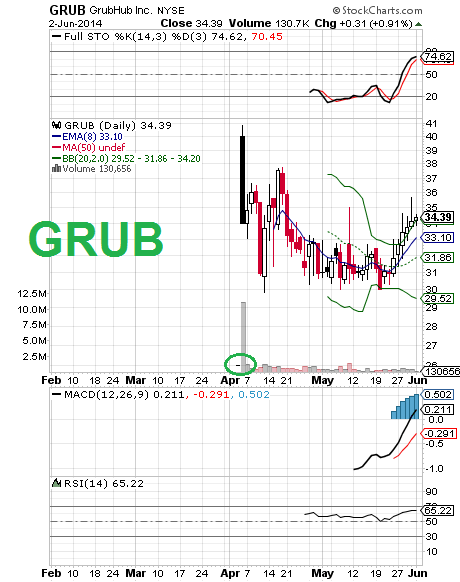4/3/14 update :
- GrubHub Inc. is going public at $26 per share, above the target of $23 to $25 per share set earlier this week, according to a securities filing.
- At $26 per share, the Chicago-based company will have a total market value of $2.1 billion and will raise about $104 million.
- GrubHub is set to start trading on Friday, April 4, 2014 on the New York Stock Exchange under the symbol "GRUB".
The online food-ordering business said this morning it expects to offer 7 million shares at $20 to $22 a share — but GrubHub itself is only selling 4 million shares, raising about $76 million and giving the company an overall market value of $1.7 billion.
Matt Maloney, chief executive officer and co-founder of GrubHub.
The rest are being offered by insiders, including CEO Matt Maloney, who plans to sell 475,200 shares. Assuming GrubHub gets $21 per share — and it may well get more if the IPO market remains hot — that's nearly
$10 million for the
38-year-old founder.
It's about 19 percent of his holdings, and he'll still have 2.1 million shares, or 2.7 percent of the stock after the IPO, according to the prospectus. So it's not as if he's cashing out completely.
The insider sales could be a reflection of GrubHub's small float, or the amount of a company's stock available for trading on the open market. The company is selling just 5 percent of its stock to the public, which could create short-selling headaches later, as Groupon saw when it sold just 6 percent of its shares in its IPO. Including the insider sales, GrubHub will have a float of about 9 percent.
But it's a potential red flag to investors when insiders want to sell at the same time they're asking the public to buy — but before it's clear retail investors will make money. It's also a reflection that GrubHub and its partner, Seamless, have accumulated a lot of mouths to feed in their long route to an IPO, and those investors have waited a long time for a payday. GrubHub is a 10-year-old company; Seamless, which already has been bought and sold once, was founded in 1999.
“They must feel pretty confident the IPO is going to do well,” said Tim Loughran, a finance professor at University of Notre Dame, who studies IPOs. “The fact that the market is letting them do it, is an indication that the IPO is going to be successful and have a nice first-day pop.”
The company declined to comment.
The biggest selling shareholder in GrubHub's IPO is Spectrum Equity Associates, which is selling 669,745 shares, worth about $14.1 million. Spectrum was an investor in Seamless, the food-delivery company that GrubHub merged with last year to bulk up enough to go public.
Boston-based Spectrum still will be the largest investor in GrubHub after the IPO and its sale — with about 10.6 percent of the stock.
Other sellers include GrubHub's early Chicago backers, Origin Ventures and Leo Capital Holdings. Chicago-based Origin plans to sell 229,225 of its 4.6 million shares, a slice worth about $4.8 million, but will retain a 5.6 percent stake in GrubHub. Northbrook-based Leo Capital plans to sell 248,798 shares of its 2.7 million shares, a cut worth about $5.2 million. Other sellers include Warburg Pincus, funds affiliated with Goldman Sachs and Thomas H. Lee Partners, which are selling 5 percent of their respective holdings.
































